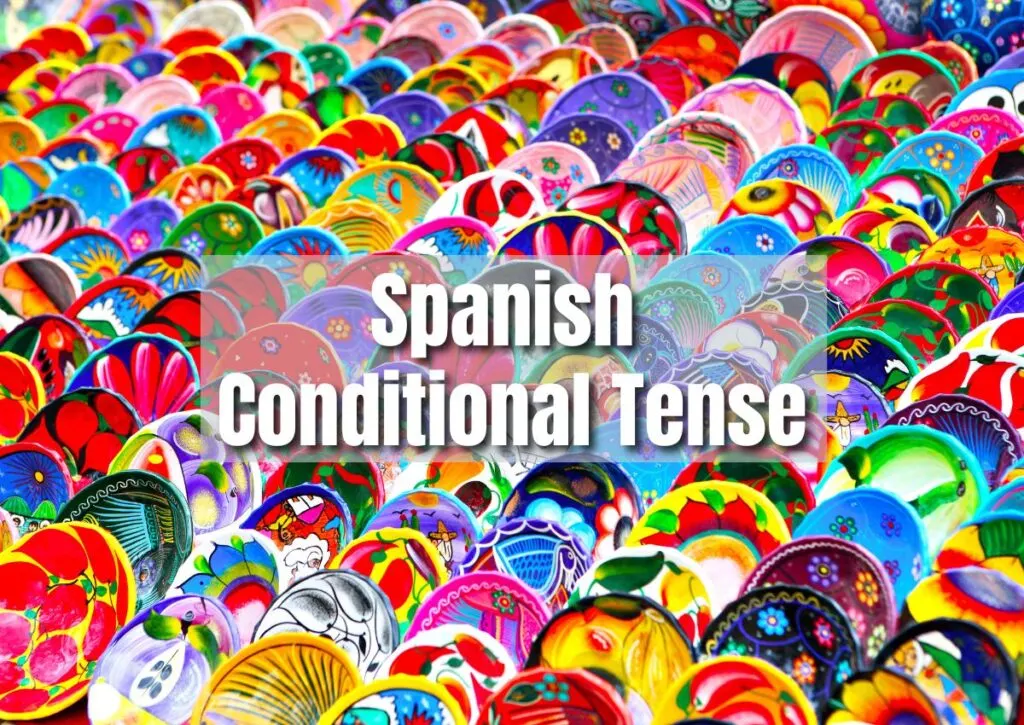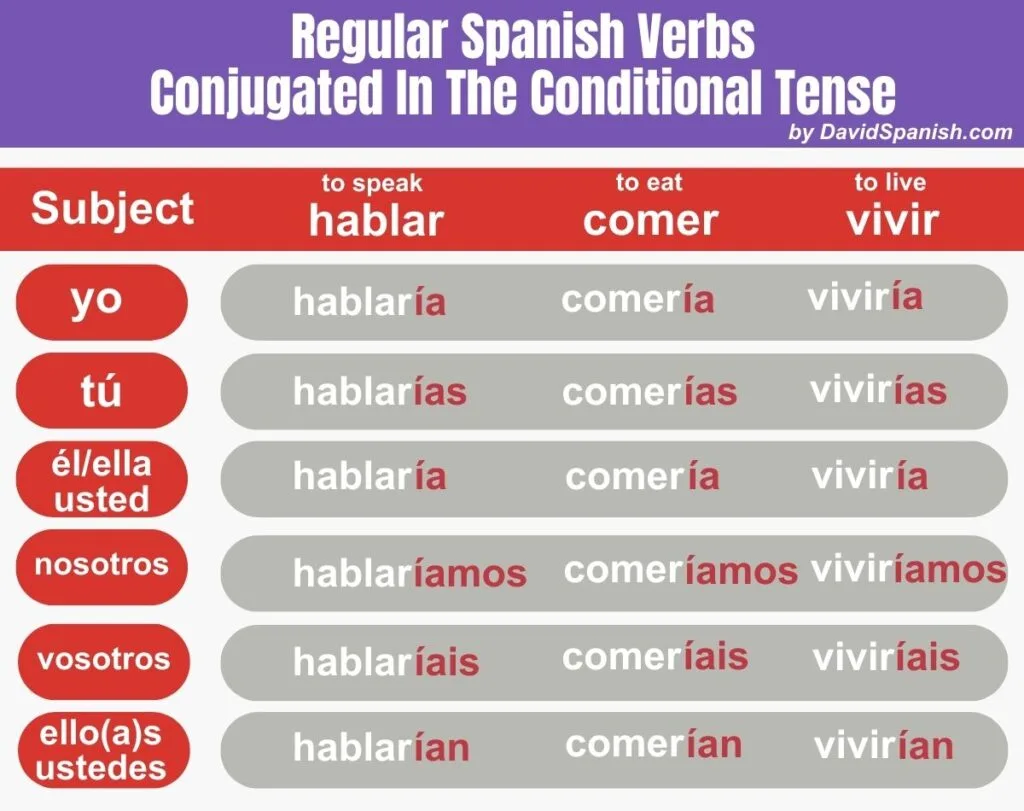What is the Spanish conditional tense?
The Spanish conditional tense is used to express hypothetical actions and equates to “would” in English. For regular AR, ER, and IR verbs, it is formed by adding the following endings to the infinitive: -ía, -ías, -ía, -íamos, -íais, -ían. In this post you’ll learn how to form and use the conditional tense in Spanish.

Formation of the Spanish conditional tense
Regular verbs
For regular verbs, the conditional tense in Spanish is formed by adding the endings -ía, -ías, -ía, -íamos, -íais, -ían to the infinitive (to form) of the verb. These endings are the same as the endings of ER and IR verbs in the imperfect tense. Furthermore, they are the same for every verb in the conditional tense in the Spanish language.

Here are some example sentences:
- Yo hablaria español. I would speak Spanish.
- Tú comerías el taco. You would eat the taco.
- Él viviría en España. He would live in Spain.
Irregular verbs
In Spanish, a set number of verbs have irregular stems in the conditional tense. Interestingly, these verbs are the exact same verbs which have irregular stems in the future tense.
The endings are constantly the same for every verb in the language, irrespective a a regular or irregular stem.
For the following ER verbs, the -e gets dropped and the endings follow the letter -r.
- caber (to fit) -> cabr (stem) -> yo cabría (I would fit)
- haber (to have) -> habr (stem) -> yo habría (I would have)
- poder (to be able) podr (stem) -> yo podría (I would be able)
- querer (to want) querr (stem) -> yo querría (I would want)
- saber (to know) sabr (stem) -> yo sabría (I would know)
For some ER and IR verbs the -e or -i at the end of the infinitive gets dropped and is replaced with the letter -d.
- poner (to put) -> pondr (stem) -> yo pondría (I would put)
- salir (to go out) -> saldr (stem) -> yo saldría (I would go out)
- tener (to have) -> tendr (stem) -> yo tendría (I would have)
- valer (to cost, be worth) -> valdr (stem) -> yo valdría (I would be worth)
- venir (to come) -> vendr (stem) -> yo vendría (I would come)
The verbs decir (to say) and hacer (to make, to do) have shortened irregular stems for the conditional tense.
- decir (to say) -> dir (stem) -> yo diría (I would say)
- hacer (to make, to do) (yo haría) (I would make, I would do)
Uses of the conditional tense
In Spanish, the conditional tense is called the potential simple. While the tense has a wide variety of uses, its underlying usage is to suggest the “potential” for actions.
Potential actions
- Dónde vivirías en España? Where would you live in Spain?
Potential desires
- Me gustaría compara la casa. I would like to buy the house.
Potential actions occurring under specified circumstances.
- ¿Dónde vivirías si tuvieras más dinero? Where would you live if you had more money?
“I wonder”
- Esperé a Martín hasta media noche pero no llegó. Qué le sucedió. I waited for Martin until midnight but he didn’t arrive. I wonder what happened to him.
“Must have”
- María no fue a la escuela. Se sentería enferma. Maria didn’t go to school. She must have felt sick.
“Was probably”
- Serían a las ocho que llamaron. It was probably at 8 o’clock when they called.
Future potential action with past reference points
- Ayer dijo que no comparía el coche. Yesterday he said that he wouldn’t buy the car.
If-then situations
- Si no estuviera enfermo, iría al trabajo. If I weren’t sick, I would go to work.
Polite requests
- Carlos, ¿podrías ayudarme, por favor? Carlos, could you help me please?
- Sr. Gomez, ¿podría Ud. ayudarme, por favor? Mr. Gomez, could you help me please?
- Sra. Fernández ¿me daria la caja, por favor? Mrs. Fernandez, would you give me the box please?
When not to use the conditional in Spanish
Note that when expressing past events which “used to” or “would” occur, you must use the imperfect tense in Spanish.
- Cuanda era niño comía helado en verano. When I was a child I would (used to) eat ice cream in the summer.
To unwillingness, “wouldn’t do it”, use the querer in the preterite tense.
- Juan no quiso comer las verduras. Juan wouldn’t eat the vegetables.
- La Bamba Meaning, Spanish Lyrics & English Translation - May 4, 2024
- Bésame Mucho Meaning, Spanish Lyrics & English Translation - May 3, 2024
- Querida – Lyrics, Meaning & Translation - May 2, 2024
